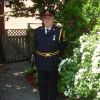Deacon trades street beat for hospital ministry
TORONTO - For nearly 30 years, George Jurenas patrolled the streets of Toronto, keeping people safe. Today, this retired cop patrols the hallways of hospitals, giving people hope.
Jurenas was ordained a deacon in 2008, and has spent most of his time since as a chaplain at Trillium Health Centre in Mississauga and with the Peel Regional Police. And while he said his main inspiration for entering the diaconate was his own parish deacon, he recognizes his years with the Toronto Police Service showed him he had what it takes.
“People would call me Father Confessor,” Jurenas laughed. “(After I arrested people) they’d be sitting in the back of the cruiser and just seemed to open up to me naturally.”
Meeting so many different kinds of people in his profession, Jurenas said, taught him some valuable lessons.
“Over the years, what I found was people aren’t evil,” he said. “No one wants to live on the streets, no one wants to rob a bank, no one wants to put a needle in their arm. There’s usually a reason why they did what they did. There’s a hurt or a pain or something behind that action that for one reason or another placed them there.”
It’s a lesson that has helped him in many situations, like once when he was faced with a patient who, to put it lightly, did not care for his help.
“I introduced myself, said hi, I’m the chaplain, and I basically get, ‘eff off,’ ” Jurenas said.
“I said hey, no problem, God bless you. But you never know. Someone could be in a real bad place… and it’s not that they don’t ever want to talk to you, it’s just at that time.”
Jurenas never gave up on this man, and eventually they were able to turn a corner. But he’s not always so calm and collected, especially working in the palliative care ward. And it is in showing his true emotions that Jurenas sees the biggest difference between his former job and current work.
“I don’t have to pretend to be tough,” Jurenas said. “I can actually cry with people. There is strength as showing your weakness. As an officer, you (have to) play … tough, and there’s a reason for it. If you act mushy people will walk all over you.
“As an officer you’re always standing behind this façade. I’m tough, I’m in control. Then you realize none of us are really in control.”
This hit close to home for Jurenas when he was diagnosed with prostate and bladder cancer himself before becoming a deacon. He underwent an operation and radiation therapy and is now in remission, but he said the experience gave him insight into what people are feeling and going through in hospitals.
“I’ve laid in that bed,” Jurenas said. “No matter what faith you are, we’re all going through the same fears, the same worries and the same pains when we’re lying in that hospital bed.”
Jurenas uses this kind of non-denominational approach to spirituality in his chaplaincy work.
“For me as a Catholic deacon, it’s really neat when I do go visit people from other faiths, whether it be Muslim, Sikh, Hindu, you name it,” Jurenas said.
“We meet together at a certain spiritual, emotional place. Some people say does it weaken your faith? I always tell them if anything, it strengthens my faith. There’s a face of Christ in all of us.”
Jurenas saw this as particularly true when he experienced what he described as a miracle — a man who was told he had months to live walked out of the hospital a year and a half later. Jurenas and the man’s wife, a Muslim woman, had been praying together every week, he with his rosary, she with her amber beads.
“There’s a sense of respect of each other, even though we’re from different faiths and backgrounds,” Jurenas said. “It just shows you when we concentrate on what we have in common, Christ finds a way.”
Jurenas has also found humour in many situations, such as the time he came across a patient and recognized him as a former biker — one whom he had arrested at least half a dozen times in downtown Toronto.
“I used to tell him, you’re not really good at (being a criminal),” Jurenas laughed. “If (I), this beat cop, can arrest you half a dozen times, you should probably look for another line of work!”
Even former arrestees, Jurenas looked to help.
“Here’s a guy, a big feared biker. When he’d walk down the street people would move out of his way,” Jurenas said. “And all of a sudden he’s like a baby, wearing a diaper, can’t really leave the bed. It really affected him emotionally, that self-esteem drop.”
And so Jurenas went out and bought this man Harley Davidson stickers for his wheelchair.
“It was just beautiful to see, he went from this depressed state to laughing and joking,” Jurenas said. “Last thing I heard he’s at a long-term care facility and he’s scooting around.”
But ever humble, this devoted husband and father of four would never take too much credit.
“I’m basically a mirror, and I just show what you have inside of you,” he said. “At the end of the day you have to realize you’re not a superhero, you’re not a saviour. You’re just a very mortal human being.
“You do what do can.”
[issuu width=600 height=360 backgroundColor=%23222222 documentId=120910160538-19846c86f786424e98153821bd480e84 name=diaconate username=catholicregister tag=anniversary unit=px v=2]


